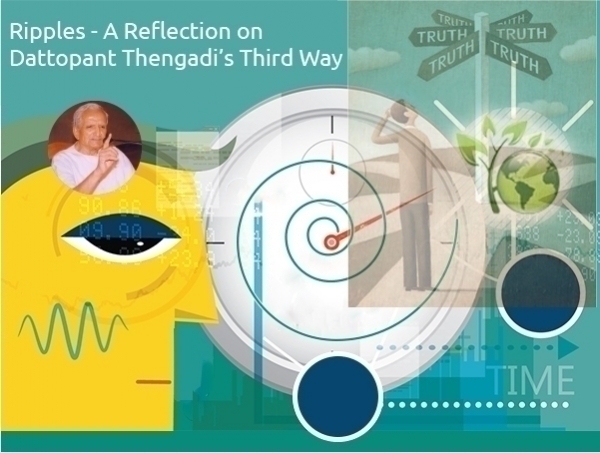Ripples A Reflection On Dattopant Thengadi's Third Way - Part 40
The old models were not totally outdated but some points do not find satisfactory explanations within the framework. New models focus on economies of scale, increasing returns, and imperfect competition.
Total Views |
I have been reflecting in my own way on Dattopant Thengadi Ji's Third Way. I present these small "ripples" that it has caused in my mind in a series. I am glad it has found its resonance in many thinking minds alike. I hope the readers have read the earlier article in the series before moving ahead.

Also Read: Ripples A Reflection On Dattopant Thengadi's Third Way - Part 39
(Swadeshi: The Practical Manifestation of Patriotism Liberation- Free Trade)
Adam Smith, ( 1723- 1790) published his book, ' The Wealth Of Nation' in which he stated that individual focus on self-interest ultimately results in the benefit of society. This supports the concept of 'free trade'. Almost after a century David Ricardo, a well-known economist, in his 'Principles of Political Theory' ( 1817) too supported Smith's theory by developing the comparative Advantages theory. (This in a way, described Dattopant, as a theoretical extension or reflection of Smith's concepts.) Market forces are expected an unhindered or free play in free trade.
Countries have to use their limited resources and take advantage of their differences compared to others. Later Ohlin (1999-1979) and James Meade (1907-1995) were awarded the Nobel prize in 1977 for their contribution to economic science. The Hechsher- Ohlin- Samuelson model emphasizes the difference in factor- endowment.( The theory represents how many resources a country has at its disposal to be utilized for manufacturing—resources such as labor, land, money, and entrepreneurship.)
Until 1970s the theory of Comparative Advantages was accepted as a valid explanation and a guide to state trade policies. Some European countries did not agree with this completely then too. The doubts were raised even then.
Towards the end of 1947 after being signed by 23 countries GATT became the avatar of free trade, it's building blocks and its philosophy of free trade. Since 1970 the doubts about the free trade theory intensified. The theory was based on a competitive market and constant returns.
Paul Robin Krugman (an American economist and public intellectual, who is a distinguished Professor of Economics) helped all see that the international markets are not competitive in the real sense, increasing returns had the key where only dominant companies could enjoy the advantages and make further gains.
Winfried Ruigrok (one of the experts) pointed out that the production process was not analyzed and technological development was supposed to be transparent as well as available to all, but this was not the case. The theory falls short of explaining the capital flow and economics of scale satisfactorily. The actual patterns of trade did not conform to the theory.
He further explains that efficient allocation of valuable or scarce resources has never been the only consideration of policies of the state. It is a complex phenomenon that weighs many factors like political, social, economic, and military considerations too. Security would always be preferred to maximize efficiency according to Ruigrok.
He makes an observation that during 1970-80 the old models were supplemented and replaced by new ones. (Almost after a century and a half) The old models were not totally outdated but some points do not find satisfactory explanations within the framework. New models focus on economies of scale, increasing returns, and imperfect competition.


